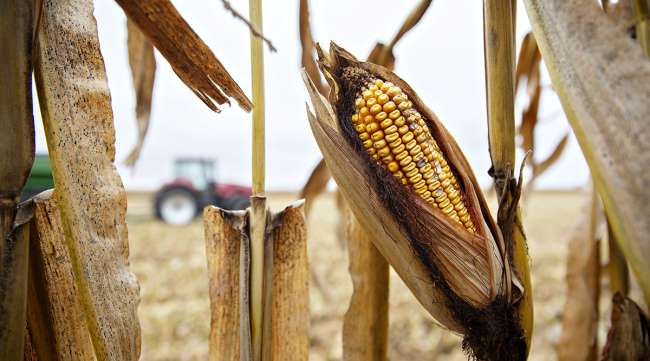Trump Rebuffs Corn Farmers With Status Quo on Biofuels

[Stay on top of transportation news: Get TTNews in your inbox.]
The Trump administration on Dec. 19 set relatively flat quotas for plant-based fuels in 2020, rebuffing ethanol and biodiesel allies who said the targets don’t do enough to support the industry.
The Environmental Protection Agency will require refiners to use 20.09 billion gallons of renewable fuel in 2020, a 0.85% increase over the 2019 requirement for 19.92 billion gallons, largely tracking a proposal released in July. The agency also is sticking with its plan for adjusting blending requirements to offset waivers exempting some refineries from the mandates, despite criticism from biofuel allies in politically important farm states that the approach is inadequate.
EPA officials say the agency’s plan effectively lays out a 2020 target for 15.8 billion gallons of conventional renewable fuels, including corn-based ethanol, with that translating to 15 billion gallons once refinery waivers are factored in.

Wheeler
“President Trump committed to our nation’s farmers that biofuel requirements would be expanded in 2020,” EPA Administrator Andrew Wheeler said in a news release. “At the EPA, we are delivering on that promise and ensuring a net of 15 billion gallons of conventional biofuel are blended into the nation’s fuel supply.”
Under the EPA rule, refiners are expected to use 5.09 billion gallons of advanced biofuel, including 590 million gallons of cellulosic biofuel. And in 2021, refiners and fuel importers will be required to use 2.43 billion gallons of biomass-based diesel made from soybeans and waste cooking oil — identical to the 2020 target.
For weeks, biofuel producers, farmers and politicians from the Midwest unsuccessfully implored administration officials — including President Donald Trump himself — to alter the EPA’s approach so that it better assures biofuel quotas aren’t undermined by refinery waivers. They say the EPA measure falls short by basing adjustments on a three-year average of Energy Department recommendations on those refinery waivers — rather than the higher number the EPA has actually granted.

Grassley
“The EPA is playing games and not helping President Trump with farmers,” said Sen. Chuck Grassley (R-Iowa). “No matter what EPA says about the impact of its waivers to oil companies making billions in profits, farmers and biofuels producers know and feel the negative impact of the agency’s actions.”
The EPA plan was likely to leave both sides unhappy. Besides the refinery waiver change, biofuel boosters had unsuccessfully sought more aggressive quotas to drive production. Meanwhile, oil companies broadly argued the measure will spur imports of foreign biofuel and complained EPA’s reallocation plan forces larger refineries to bear an unfair burden as blending requirements are raised for those nonexempted facilities.
Oil refiners have signaled they will challenge the rule in federal court.
EPA has said it will more closely follow Energy Department recommendations for refinery waivers in the future.

Ernst
But Sen. Joni Ernst (R-Iowa) said voters in her state are hesitant “to trust the word of EPA to actually follow through on that commitment.” As it is, she said, the final rule fell short of a White House-brokered agreement since future refinery waivers could exceed the amount of adjustments.
“After shaking hands in the Oval Office this fall, EPA had an opportunity to restore the broken trust of farmers and to follow through on the president’s commitment, but it appears they’ve missed the mark — again," Ernst said in an emailed statement.
The blending targets are set by EPA under a 14-year-old law meant to encourage plant-based fuels while displacing petroleum-based supplies. Opponents of the biofuel mandate say it was established under far different circumstances, when U.S. oil supplies were seen as dwindling and lawmakers were worried about reliance on foreign crude.
Want more news? Listen to today's daily briefing:




